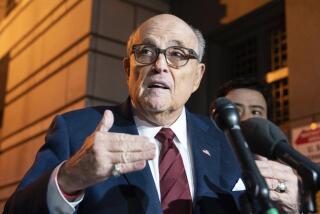Book Review : A Soap Opera From the House of Gucci
- Share via
Gucci: A House Divided by Gerald McKnight (Donald I. Fine: $18.95; 368 pages; illustrated)
Mention the name Gucci and visions of aristocratic elegance and pricey leather loafers pop to mind. From this legendary retailing empire have sprung a status-symbol handbag worthy of display in New York’s Museum of Modern Art and a best-selling floral scarf inspired by Grace Kelly.
Few would suspect that under the posh veneer lurks a history of family feuding that rivals television’s nighttime soap operas for greed and vindictiveness.
In “Gucci: A House Divided,” billed as the first full-scale account of the battle for control of the Gucci empire, British journalist Gerald McKnight takes readers on a rollicking ride--beginning with company founder Guccio Gucci’s humble start in Florence, Italy, in the 1920s and culminating in Aldo Gucci’s 1986, headline-making appearance in U.S. federal court to plead guilty to evading $7 million in taxes.
In between lies a nearly incredible rags-to-riches saga of broken marriages, illegitimate heirs, vendettas, fabrications, wartime intrigue, power lust, egos, fisticuffs--and, above all, greed. This is a Mediterranean blood feud of grotesque propositions, the stuff that supermarket tabloids are made of. It’s small wonder that the matter has come to be known as “Dallas”-on-the-Arno, after the Florentine river that once threatened to wash away much of the company’s inventory.
More Speed Than Grace
Unfortunately, the book smacks of having been written with more speed than grace, perhaps because McKnight sensed that others would be on the Gucci trail. Although chockablock with delectable tidbits, the book is marred by writing that is frequently clunky.
For example, when Guccio Gucci, as a young worker at London’s Savoy Hotel, gets a glimpse of the luggage toted by the upper-crust visitors, we are treated to the thought process that might have prompted him to produce his own leather goods:
“And these containers of mobile living were made of leather, a material Gucci had grown up with. . . . Leather was something he could identify with even in this strange, splendid new world.”
McKnight clearly did his homework--interviewing many members of the Gucci family and poring over piles of legal documents. He has captured the spirit of the Guccis--their scrappiness in the face of natural disasters and financial adversity, their constant emotional bickering.
(One unsettling element gets particular attention. While the Guccis treated customers such as Princess Grace and Jackie Kennedy Onassis with great deference, they frequently treated their own daughters and wives as second-class citizens, allowing them no say in the family business. In the early days, it was also apparently common for the Gucci men to seduce shop girls or customers in the fitting rooms.)
Disjointed Presentation
But, interesting as the material is, it is often presented in a disjointed way. Family comments, many made jarring by coarse language, intrude on the historical picture. And, although the author says his prime intent was to avoid taking sides, he seems to bend over backward to be kind to some of the principals--particularly to Paolo, Aldo Gucci’s middle son and the one whose legal action after a violent board meeting started the ball rolling that led to his father’s imprisonment.
What emerges is a portrait of a family for whom dishonesty appears to have been a way of life--starting with embellishments to the legend of Guccio Gucci that transformed the struggling young man into a royally appointed saddle maker to Tuscany’s noble families.
The book draws no conclusions. The legal battle between Paolo Gucci and other family members rages on in a tempest that borders on comedy. Ironically, since publication, the company’s board of family members has resigned and a 47-year-old woman economics professor--unrelated to the Gucci clan--has been put in charge of the business.
McKnight offers signs of having lost some perspective when he writes: “Any possible comic-opera aspect of these charges and countercharges is misleading; they are both serious and threatening as well as immensely costly.”
Speaking of costly, has he checked the price of a Gucci handbag lately?
More to Read
Sign up for our Book Club newsletter
Get the latest news, events and more from the Los Angeles Times Book Club, and help us get L.A. reading and talking.
You may occasionally receive promotional content from the Los Angeles Times.









